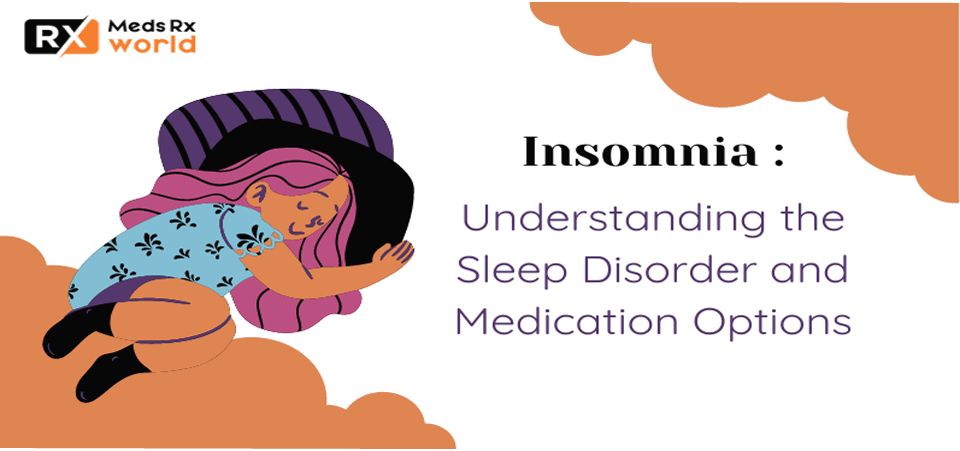Insomnia: Sleep Disorder and Medication Options

Insomnia, a common sleep disorder, affects millions of people worldwide. It can have a significant impact on a person's overall well-being, affecting their physical health, mental health, and overall quality of life.
In this blog, we will explore what insomnia is, its causes, and various medication options available to manage this sleep disorder effectively.
Overviews
Insomnia is a sleep disorder characterized by difficulty falling asleep, staying asleep, or experiencing non-restorative sleep despite having adequate opportunities to sleep.
Individuals with insomnia often wake up feeling tired and groggy, which can lead to daytime fatigue, mood disturbances, and reduced cognitive function.
Types
The sleep disorder insomnia is characterized by having trouble falling asleep and/or waking up early in the morning.
It is often characterized as the inability to consistently maintain the required amount of sleep for an individual or a pattern of persistent trouble falling or staying asleep.
Depending on how frequently it occurs and how long it lasts, it can range from moderate to severe.
Acute Insomnia
This type of sleep disorder is short-term and typically lasts for a few nights to a few weeks. It is often triggered by stress, significant life events, or changes in sleep patterns due to travel or shift work.
Chronic Insomnia
Chronic insomnia is more persistent, lasting for three or more nights a week for at least three months. It may be caused by underlying medical conditions, psychiatric disorders, or poor sleep hygiene habits.
Causes
Various factors can contribute to the development of insomnia. Some common causes include:
Stress and Anxiety
- Everyday stressors, work pressure, financial worries, or personal issues can lead to difficulty in falling asleep.
Medical Conditions
- Conditions such as chronic pain, respiratory problems, gastrointestinal issues, or hormonal imbalances can disrupt sleep.
Mental Health Disorders
Depression, anxiety, and other psychiatric conditions are strongly associated with insomnia.
Poor Sleep Hygiene
- Irregular sleep schedules, excessive use of electronic devices before bedtime, or consuming stimulating substances like caffeine and nicotine can disrupt sleep.
Medications
Certain medications, such as stimulants or medications that alter sleep patterns, can interfere with normal sleep.
Insomnia Medication Options
When it comes to managing insomnia, lifestyle changes and behavioral interventions are the first line of defense. However, in some cases, medication may be necessary to improve sleep quality and overall well-being.
It is essential to consult a healthcare professional before starting any medication for insomnia, as they can help determine the best treatment plan based on individual needs and medical history.
Over-the-Counter (OTC) Sleep Aids:
OTC sleep aids are available without a prescription and can be effective for short-term or occasional insomnia.
These medications often contain antihistamines, which have sedative effects that promote drowsiness.
Common OTC sleep aids include diphenhydramine and doxylamine. However, prolonged use of these medications may lead to tolerance and decreased efficacy.
Prescription Medications:
Benzodiazepines
- Benzodiazepines, such as temazepam and lorazepam, are sedative medications that can help induce sleep.
- However, they are generally prescribed for short-term use due to their potential for dependence and withdrawal symptoms.
Non-Benzodiazepine Hypnotics
- Medications like zolpidem (Ambien), zaleplon (Sonata), and eszopiclone (Lunesta) are commonly prescribed for insomnia.
- They work on specific receptors in the brain to promote sleep and are generally considered safer than benzodiazepines for long-term use.
Melatonin Receptor Agonists
These medications, including ramelteon (Rozerem) and tasimelteon (Hetlioz), target melatonin receptors to regulate the sleep-wake cycle.
They are particularly useful for individuals with circadian rhythm disorders.
Orexin Receptor Antagonists
Suvorexant (Belsomra) is a newer class of medications that blocks orexin, a chemical in the brain that promotes wakefulness. It helps in initiating and maintaining sleep without affecting the stages of sleep.
Antidepressants
In cases where insomnia is closely associated with depression or anxiety, doctors may prescribe certain antidepressants, such as trazodone or amitriptyline, which also have sedative properties.
Conclusion
Insomnia can significantly impact a person's physical and mental health, making it essential to address the condition effectively.
While medication can be a useful tool for managing insomnia, it is crucial to consider lifestyle changes, sleep hygiene practices, and behavioral interventions as part of the overall treatment plan.
Additionally, it is important to consult with a healthcare professional to determine the most appropriate medication and dosage for each individual case.
Remember, a good night's sleep is vital for overall health and well-being, and seeking proper treatment can help restore restful and rejuvenating slumbers.

Leave a Reply